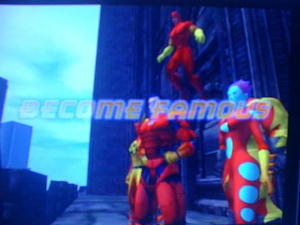Wednesday 20 March 2002

|
Pic of the day: "Become famous" - screen photo from City of Heroes teaser movie. EverQuest in spandex?Meh. Stress at work, hand hurts. Just want to hide. Just want to get away. But teaser movie cheers me up. I know it's highly unlikely to come true; too good to get realized; but perhaps they have the good sense to scale down to the possible and expand later. One can always hope. The CoH boards are quite active. There is a hectic debate about loot, for instance. Evidently Cryptic (the developers) have decided to let there be loot when you raid lairs of evil gangs. This has set the blood boiling among the purists. I'm not happy about it myself, actually. Let me explain. ***There are several technically advanced Massive Multiplayer Online RPGs out there already. The most popular genre is sword & sorcery, or medieval fantasy if you will. EverQuest is there, the biggest. Ultima Online, the classic. (And probably most hated of the lot because of its rampant player killing.) Dark Age of Camelot, the newest of that crop. Asheron's Call, the exclusive. They share a lot of features, from interface to basic game idea. A new crop is coming up. Anarchy Online is set in a hi-tech future. There is a Star Wars based game in the works, and a few others. The competition will only get harder, even though the market expands still. In this market, you have to decide how you will attract and keep your players. Accumulating all the popular traits of your competitors seems like an obvious choice. Or at least the most popular traits. But this is less applicable if you want to do something different. And while finding loot is the way of life in high fantasy role playing, it is not what super people do for a living. ***That is not to say that Supers don't find stuff. My childhood's Superboy used to have a shelf with strange objects collected through his adventures, some of them from defeated enemies. The adult Superman had even more of the stuff, in his Fortress of Solitude. But these were rarely essential to the story. They could be - the phantom zone machine comes to mind - but mostly they were quite tangential. There were "object oriented" heroes: Green Lantern was pretty much defined by his ring, though he would sometimes do something without it just to show the readers that it was the moral fiber that made a hero, not the power source. Captain America's shield was even less defining, though it rarely left his side for decades. And so on. But they did not get this stuff by plundering fallen enemies. And they did not trade it. Looting is not what super people do for a career. They don't seek out enemies that give lots of loot, rather than poorer villains. They don't beg more experienced heroes for cool stuff, or trade it between each other. They certainly don't make a living out of it. In fact, while a few superheroes are paid by the government, many have to scrape by on the income of their secret identities. The temptation to loot a villain's lab and sell stuff must have been there often enough for poor starving student and freelance photographer Peter Parker; but that's just not what heroes do. With great power comes great responsibility. A hero does not loot; it is just not heroic. ***And looting is just one example of things that don't necessarily parse well when translated from high fantasy to the superhero genre. PvP is another. (Player versus Player fighting.) Hero vs Hero is quite common especially in the Marvel Universe, where heroes are less clear cut than over at DC. But these fights are usually due to misunderstandings, mind control, or ideological differences (like Soviet vs US heroes during the cold war). There is an undertone of chivalry, not to mention fan service. The heroes are not really enemies. Sometimes rivals, but not real deadly enemies. Cryptic has taken the consequence of this and excluded player killing and most of the PvP altogether, while building an "arena" where players can settle their scores and find out who is really the big guy. Or at least that is the current plan. Death in general is another difference. In medieval fantasy games, people die easily but are resurrected easily. In comics, they die rarely and come back only after a while, sometimes not at all. Cryptic has deviced a compromise: If you are on the brink of death, you are teleported out of danger and hospitalized. You lose the fight, obviously, and incur the corresponding fame loss and money loss. But the whole resurrection system is dispensed with. Nice job Cryptic. As the competition hardens, the developers will be tempted to include more and more goodies. But not only will that delay the game, it may also offend the core fans. The ones who will become paying members. I suspect that these will not be recruited from disgruntled EverQuest players the way DAoC has done. Rather, the millions of comic book fans all over the world are the most likely to flock to Paragon City and join the battle for justice, freedom or the American Way of Life. As for me, I'd be quite happy to just remain a low-level hero: Flying leisurely among the skyscrapers, occasionally blasting some common thugs with my telekinesis and collecting enough bounty to pay my rent. The day I need to camp for power items, I'll go back to Camelot. |
More sun. |
Yesterday <-- This month --> Tomorrow?